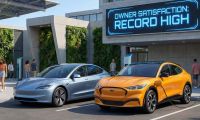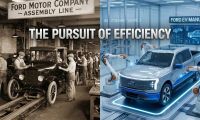Tesla's 4680 cells could eventually reach 500 gigawatt-hours in long-term production, but Elon Musk is aiming even higher. He hopes to produce over 1,000 gigawatt-hours in the future. This is a huge step forward for Tesla and the automotive industry, and it will be interesting to see how long it takes the rest of the industry to catch up.
“We expect the new cell factory to produce at least 100 gigawatt-hours. And that’s really just to begin with. Long-term, Tesla is aiming to produce well over 1,000 gigawatt-hours, possibly 2,000 or 3,000. So this really is just the start. And that’s equivalent to 1.5 million additional Model 3/Y vehicles, and we’ll also be using 4680 for stationary storage as well. And to be clear, this is in addition to our suppliers,” Musk said.
This is good news because in order to make an announcement like this Tesla must have 4680 mass production solved. Let's face it, no one in the automotive industry has been able to catch up with Tesla since it opened its doors. The big question for me is: how long will it take the rest of the automotive industry to get to where Tesla is today?
The 4680 cells are an important step in the road to a greener and more sustainable future. With Tesla leading the way, the future of electric vehicles is looking brighter than ever.
Tesla's relatively-recent announcement of its new 4680 battery cells has sent shockwaves through the electric vehicle industry. These new cells, which are named after their diameter (46mm) and length (80mm), are not only larger and more energy-dense than their previous versions, but they also have the potential to significantly decrease the cost of production for Tesla cars.
One of the most significant aspects of these new cells is their energy density, which is the amount of energy that can be stored in a given volume or mass. The 4680 cells have an energy density of up to 5 times higher than Tesla's previous 2170 cells, which means that they can store more energy in a smaller space.
This means that Tesla will be able to produce cars that have a longer range and can travel farther on a single charge. This is particularly important for electric vehicles, as range anxiety is one of the biggest concerns for potential buyers.
Another significant aspect of the 4680 cells is their cost. Tesla has stated that these new cells will be cheaper to produce than their previous versions. This is because they are made of a new type of material called NCA (Nickel Cobalt Aluminum) which is cheaper and more abundant than the NMC (Nickel Manganese Cobalt) used in the 2170 cells.
This will allow Tesla to decrease the cost of production and ultimately, the price of their cars, making them more accessible to the average consumer.
This is a game-changer for the industry as a whole. It means that Tesla will be able to produce cars that are not only more efficient and have a longer range, but also more affordable for the average consumer.
This could lead to a massive increase in the adoption of electric vehicles, which is crucial for reducing our dependence on fossil fuels and fighting climate change. Electric vehicles emit less CO2 and other pollutants than traditional gasoline or diesel cars, and are thus considered a more sustainable form of transportation.
But it's not just the environmental benefits that make these new battery cells so significant. They also have the potential to create jobs and stimulate economic growth.
As Tesla and other companies begin to adopt these new cells, there will be a need for more research and development, as well as an increase in production and manufacturing. This will create new opportunities for workers in a variety of fields, from engineering to manufacturing. It also means that Tesla will be able to produce more cars in a shorter period of time, leading to more revenue, and more investments in the company.
Overall, Tesla's 4680 battery cells are a major step forward in the electric vehicle industry. They have the potential to revolutionize the way we think about and use electric cars, and it's exciting to see what the future holds for this technology.
The 4680 cells will be used in Tesla's Cybertruck, Semi, and Roadster models, as well as the upcoming Model S and Model X refresh. The company also plans to use them in its solar products, further expanding their reach. With the increasing demand for electric vehicles, and with the release of the 4680 cells, Tesla is positioning itself to be at the forefront of the industry.
Armen Hareyan is the founder and the Editor in Chief of Torque News. He founded TorqueNews.com in 2010, which since then has been publishing expert news and analysis about the automotive industry. He can be reached at Torque News Twitter, Facebok, Linkedin and Youtube.
Set Torque News as Preferred Source on Google











